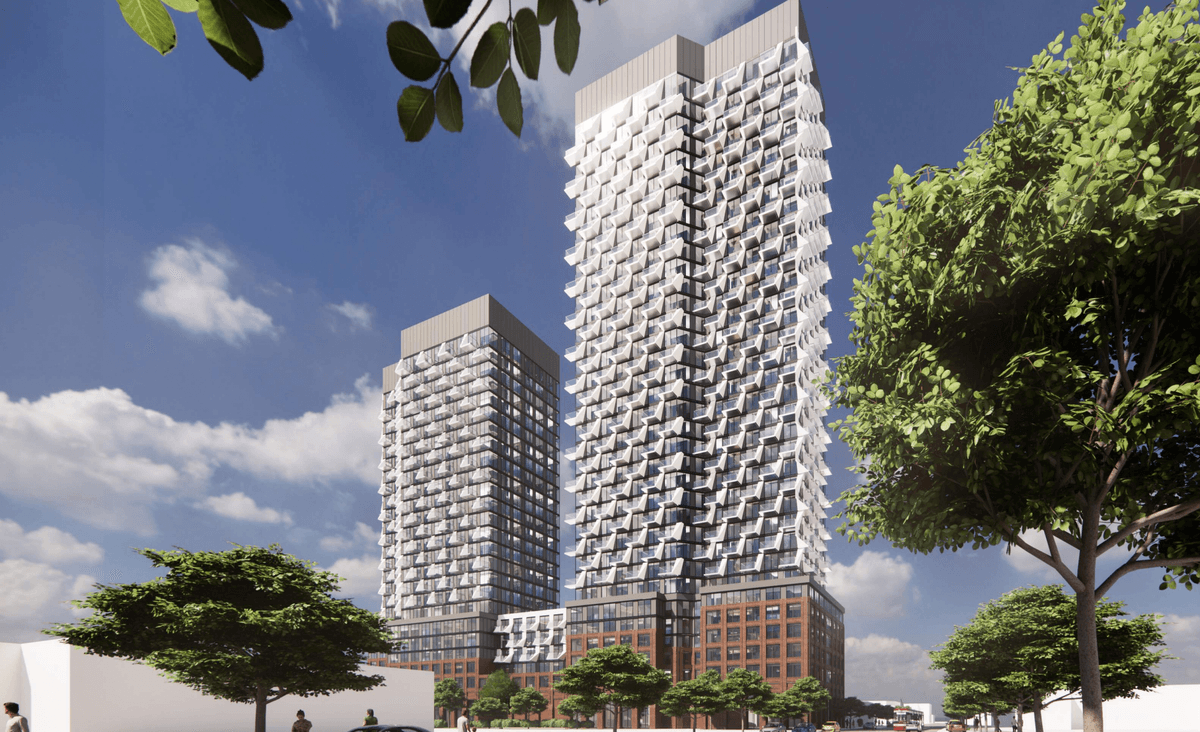Early last year, Westbank Corp. and the City of Toronto opened a lottery for 37 affordable apartments at the former’s Mirvish Village rental development on the iconic site of the late Honest Ed’s store. By the time the lottery closed on March 6, 2023 — just three months after launching — it had attracted 8,429 applications. Several months later, in August, another lottery for 104 apartments at Canary Landing, near the Distillery District, closed having garnered 6,520 expressions of interest.
“It’s a brutal system,” Mark Richardson, technical lead at volunteer-based organization HousingNowTO, which has been following the city’s rental-lottery processes, tells STOREYS. “Affordable rental housing units are as rare as Taylor Swift tickets and are in demand as much as Taylor Swift tickets,” he adds.
Since March 2018, when the city began using a lottery system for new affordable housing, it has overseen 18 lotteries, for a total of 858 affordable units. The lotteries, which were inspired by similar processes in New York City, Boston, San Francisco, and Amsterdam, essentially encourage anyone who meets certain criteria, such as having a household income within a certain bracket, to throw their hat in for a chance at an affordable rental. These lotteries are used exclusively for developments that have received financial benefits from the city. With the local lottery procedures facing some criticism — there’s currently no central lottery database, so apartment-seekers have to fill out separate applications for each individual opportunity, for example — the city plans to introduce a revamped system for applications next year.
“Beginning in late 2025, the City is moving towards a new hybrid model for allocating all affordable rental units,” the City revealed to STOREYS in an email statement. Under the forthcoming hybrid approach, the City says, developments containing 10 or more affordable units will see half of the below-market apartments opened up to a random draw. Tenancy for the other half will be offered on a first-come, first-served basis through a new chronological waiting list (if the development has fewer than 10 affordable units, all will be allocated via the waiting list).
“This approach allows newcomers to Toronto and those who have a specific interest in a new development the opportunity to access a unit in a new development while also responding to feedback from consultations the City undertook in 2021,” the City statement continues. During consultations in 2021, the City says, there was strong feedback in support of a waiting list “that favours those waiting the longest for affordable housing.”
Under the current lottery system, active rental lotteries are posted to a section of the City of Toronto’s website. But the actual online applications, where users fill out personal information, are hosted on separate developer websites created on an ad hoc basis. That has created accessibility issues, says Richardson of HousingNowTO. “Some are basically a Microsoft webform or a Google Doc in some cases I’ve seen and other times they’re a custom website,” he says.

When the city launches its new hybrid model, though, this will change. All lottery submissions will be processed through MyAccesstoHousingTO, an online system currently used for rent-geared-to-income housing applications, according to the statement from the City: “Through this online applicant portal, residents will have a central application, can store documents, and will be able to view and express interest on multiple affordable housing unit vacancies in one place.”
More changes are needed beyond establishing a central database, says Richardson. Given the overwhelming demand for lottery units, Richardson says the city should take a page from Taylor Swift’s Eras Tour. For most dates on the popstar’s tour, Ticketmaster held lotteries for access to tickets. Fans had to sign up for the chance to receive a code, which could then be used to purchase tickets within a certain timeframe. “The problem right now at the city is we open the floodgates to everybody and then they put in a full application before they even know they have a chance of getting a unit,” Richardson explains. By adopting Ticketmaster’s process, fewer apartment hunters would have to spend time filling out a full application only to be turned down.
Asked in a follow-up email whether Toronto was considering changing the structure of the lotteries to include randomization earlier in the process, the City only reiterated that it was moving towards a hybrid model.
While Richardson says the lottery process should be improved, he says that random draws are ultimately the way to go. “It avoids corruption,” Richardson continues, pointing to 2007 allegations that Toronto Community Housing Corp. officials accepted bribes from residents hoping to jump the affordable-housing wait list at the time.
“When something is in such high demand, people are going to try everything they can to game the system.”





















